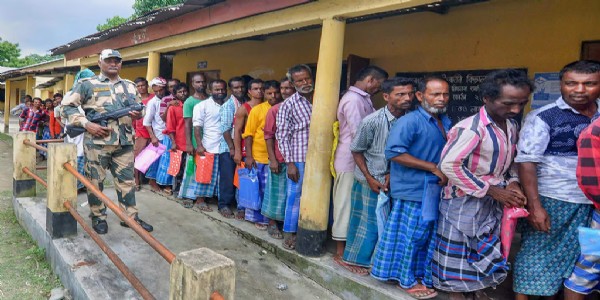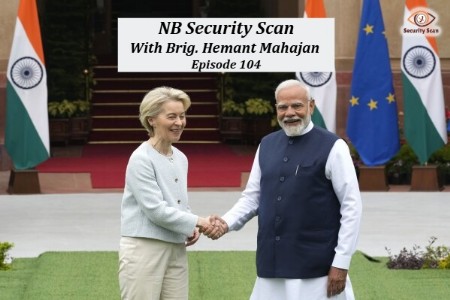#SecurityScan 46: Combating Narco Terrorism on Darknet, Manipur Violence & more
The lawmakers have previously called for a ban on the sale and use of security cameras made by Hikvision and DahuaBritain barred TikTok on government phones in March, while in 2020 it said it would ban Huawei from its 5G network.
Total Views | 130
This article is a summary of important events that have taken place in last one week affecting, India's national security.
Countering Chinese Multidomain War
3-month deadline for work plan in villages along China border
A large number of villages under the scheme lack telecom and road connectivity and are facing the issue of thinning population. One of the villages, Kibitho in Arunachal Pradesh, saw operationalisation of the first 4G telecom tower last month, officials said. Union home minister Amit Shah had launched VVP from Kibitho in April.

Ponung Doming becomes Col in Indian army
Ponung Doming has become the first female officer from Arunachal Pradesh to be promoted to the rank of colonel in the Indian army.
BRO informed that Col. Doming who is with Corps of Engineers post her promotion will be taking over the command of a border road task force (BRTF) in the strategically important Leh sector under union territory of Ladakh. She is a native of Pasighat in East Siang district.
Rajnath Singh pitches for opportunities for German FDI in UP & TN defence industrial corridors
Rajnath Singh stressed that India and Germany could build a more symbiotic relationship based on shared goals and complementarity of strength, namely skilled workforce and competitive costs from India and high technologies and investment from Germany.
Indian Navy's eco-friendly initiatives imbibing green tech
The Navy has commissioned solar power with a cumulative capacity of 15.87 MW which is in line with the its objective of fulfilling the government's 'Jawaharlal Nehru National Solar Mission (JNNSM)' mission.
Army Chief Gen Manoj Pande on two-day visit to Bangladesh
Aim is to expand bilateral defence and security ties. It is his second visit to Bangladesh after assuming the top post last year. He will meet senior military officials and participate in the passing-out parade of officer cadets of the 84th 'Long Course' at the Bangladesh Military Academy in Chattogram, where he will present the 'Bangladesh India Friendship Trophy' to the best foreign cadet from friendly foreign countries.
Significant milestone: Indigenously made torpedo successfully engages underwater
The Indian Navy and Defence Research and Development Organisation (DRDO) achieved a milestone after an indigenously developed heavyweight torpedo successfully engaged an underwater target. The Indian Navy called it a ‘significant milestone’ in its quest for accurate delivery of ordnance on target in the underwater domain.
UK to remove Chinese-made surveillance equipment from sensitive government sites. The lawmakers have previously called for a ban on the sale and use of security cameras made by Hikvision and DahuaBritain barred TikTok on government phones in March, while in 2020 it said it would ban Huawei from its 5G network.
Japan to expand support for 'Global South' to tackle China and RussiaJapan decided Thursday to boost its infrastructure support for emerging and developing nations, referred to as the “Global South,” in a bid to curb their dependence on China for vital materials and components for batteries and solar panels. In its revised strategy, the administration of Prime Minister Fumio Kishida pledged to accelerate support in the Global South for infrastructure development, including manufacturing bases and transportation networks, as well as the use of hydrogen and ammonia.
New US Spy Satellites to Track Chinese, Russian Threats in Orbit
The US Space Force is set to launch a constellation of satellites this summer to track Chinese or Russian space vehicles that can potentially disable or damage orbiting objects.Dubbed “Silent Barker,” the network would be the first of its kind to complement ground-based sensors and low-earth orbit satellites, according to the Space Force and analysts. The satellites will be placed about 22,000 miles (35,400 kilometers) above the Earth and at the same speed it rotates, known as geosynchronous orbit.
US releases video of close-call in Taiwan Strait with Chinese destroyer
China claims the democratic self-governing island of Taiwan as part of its own territory, and maintains the strait is part of its exclusive economic zone, while the U.S. and its allies regularly sail through and fly over the passage to emphasize their contention that the waters are international. Military interception maneuvers by Chinese ships and planes suggest a “growing aggressiveness” from Beijing and risk an accident that could result in injury.“It won’t be long before somebody gets hurt,” National Security Council spokesman John Kirby told reporters.
China's air patrols with Russia spark Japanese security concerns
Japan has raised security concerns after China completed second phase of joint patrols with Russia over the Western Pacific on Wednesday. These concerns have been conveyed to China and Russia through diplomatic channels. Along with Japan, South Korea also mobilized its fighter jets when Russian and Chinese military aircraft entered its air defence zone.
China's Cold War mentality
China's warning to the US and Canada for holding joint navy exercises in the Taiwan Strait should be taken seriously. The objection came from Beijing's defence minister, and correlated with their objection to "non-Chinese" engagements in Asia and the Indo-Pacific region, as it increases security risks.
India should take this as a signal to continue to engage with countries in the region for ensuring that the Indo-Pacific remains free, open and rules-based.
World's Spy Chiefs Meet In Secret Conclave In Singapore
Such meetings are organised by the Singapore government and have been discreetly held at a separate venue alongside the security summit for several years. The meetings have not been previously reported.
How the Chinese government is using Uyghurs’ families to control them abroad
Chinese policemen are gas lighting Uyghurs in exile.Even those who keep their heads down find themselves the target of psychological torture.
Fiji rethinks police deal with China amid rising Pacific tensions
Previous Fijian government signed a memorandum of understanding in 2011 enabling its police officers to undergo training in China.
Internal Security
Combating Narco terrorism on the Darknet:

The Narcotics Control Bureau (NCB) made a significant breakthrough in its fight against drug cartels by dismantling a pan-India network operating on the darknet. Through meticulous strategic planning and operational execution, the NCB successfully conducted a raid that resulted in the seizure of 15,000 blots of LSD, a potent synthetic hallucinogenic drug commonly known as Ecstasy. They apprehended six individuals in their twenties from different cities across the country. This operation highlights the commitment India to confront the escalating technological challenges posed by illegal drug trade.
For nearly a decade, it has been evident that drug traffickers resort to utilizing darknet marketplaces to evade law enforcement. The darknet operates on The Onion Router (ToR), an internet platform that ensures anonymity for traffickers and customers, making it challenging to trace and infiltrate. Their modus operandi involves covertly attracting customers through social media, conducting transactions using cryptocurrencies, and employing courier services for delivery. According to the 2020 report by the United Nations Office on Drugs and Crime, the dark web's major drug markets generate an estimated annual revenue of $315 million.
LSD was sourced from Poland and the Netherlands and distributed throughout India, drug syndicates often have international alliances. These criminal networks are skilled at staying one step ahead of authorities by adopting the latest technological tools to avoid detection. To effectively dismantle such operations, the sharing of knowledge and resources among concerned agencies is crucial. Recognizing this, the Central government has established the Narcotics Coordination Mechanism to facilitate collaboration between state-level and national efforts. Moreover, India has entered into agreements and Memoranda of Understanding (MoUs) with various countries to enhance cooperation between the NCB and international partners in combating the drug menace.
Addressing the challenges of drug terrorism in India requires a comprehensive and multi-faceted approach that combines law enforcement, intelligence sharing, international cooperation, and preventive measures such as strengthening law enforcement, border control and maritime security, public awareness and prevention, financial investigations, Interagency collaboration, investing in research and development to stay ahead of evolving drug trafficking methods and technologies is vital.
Manipur Violence Continues
As violence continues, GoI needs to seriously review the functioning of Manipur’s administration & police.The ongoing turmoil in Manipur is chock-full with incidents, where the state police has simply melted away. The recent attack on MLA Ranjit Singh’s residence by suspected Kuki insurgents and the torching of 32 houses of the Kuki-inhabited Natyang village happened despite GoI making serious attempts to work towards peace. No matter how many central forces GoI deploys to the strife-torn state, law and order cannot be enforced without the professional, unbiased conduct of the local police.
The violence in Manipur has engendered huge distrust between the state’s Meitei and Kuki communities. And fundamental to this situation is the distrust of the state police itself.
The failure of the police also strengthens the belief among the tribal communities that their only source of protection are the armed ethnic insurgents. So, a vicious cycle is in play where the abdication of the state police force is providing a fillip to insurgency, which in turn is making peace in Manipur even more elusive.
External Security
India hit out at Canada for giving space to Khalistani separatists extremists
At a media briefing, External Affairs Minister S Jaishankar said Canada allowing anti-India elements to operate from its soil is not good for the bilateral relationship as well as for itself.
A video has emerged on social media that showed a float depicting the assassination of Indira Gandhi. It was reportedly part of a parade that was organised by some Khalistani elements in Brampton.
"On some Indian students facing difficulties in Canada over charges that they did not study in the colleges they applied for, Jaishankar said India has taken up the issue with Canadian authorities.
And the bigger issue involved really is the space that Canada has continuously and frankly we are at a loss to understand other than the requirements of vote bank politics, why anybody would do this?
India and US Forge Closer Defence Cooperation Ahead of PM Modi's Visit to Washington
US Defence Secretary Lloyd Austin met with National Security Advisor Ajit Doval in New Delhi on Monday to discuss Indo-Pacific and cooperation in specific technologies across military, maritime, and aerospace domains.
India and the US have decided to establish an ambitious roadmap for defence industrial cooperation, US Defence Secretary Lloyd Austin said on Monday after wide-ranging talks with his Indian counterpart Rajnath Singh.
With Prime Minister Narendra Modi's visit to Washington just two weeks away, India and the United States have reached an agreement on a roadmap for defence industrial cooperation. The aim is to expedite technology collaborations and co-production of military platforms, including air combat and land systems. As part of this agreement, both sides have decided to commence negotiations on the Security of Supply Arrangement and a reciprocal defence procurement pact, which will promote stability in the supply chain.
Over the past decade, India-US defence ties have witnessed significant progress, thanks to several key agreements. These include the Logistics Exchange Memorandum of Agreement (2016), enabling mutual use of military bases for repair and replenishment; the Communications Compatibility and Security Agreement (2018), facilitating interoperability and technology transfers; and the Basic Exchange and Cooperation Agreement (2020), allowing the sharing of cutting-edge military technology, logistics, and geospatial maps.
Despite these initiatives, the United States currently ranks third among India's major arms suppliers, with an 11% share, trailing behind Russia (45%) and France (29%). This indicates that the US still has a considerable distance to cover in becoming a more significant stakeholder in India's defence imports and a prominent contributor to the 'Make in India' program. India's preference for Russian and French manufacturers is attributed to factors such as reliability, quality control, cost-effectiveness, and ease of doing business.
In a huge step-up for India-US strategic relations, the two sides have cleared the decks for co-producing fighter jet engines that will power India’s future air combat platforms. The formal signing is likely to happen during PM Modi’s US visit later this month and is said to involve 100% transfer of technology for the GE-F414 engines. To put this into context, only four countries make their own jet engines – the US, the UK, Russia and France – while China has achieved much by reverse engineering Russian jet engines.
Not only has importing defence equipment from Russia become harder due to US-led sanctions against Moscow, there is also now no guarantee of this supply route in the eventuality of a conflict between India and China. Plus, India’s interests align more with the US in East and West Asia, as well as in Africa, where China and Russia are together trying to re-write the rules of the game. So, strengthening the India-US military relationship is not only crucial for New Delhi to meet its immediate strategic-security challenges but also in terms of its necessary ambition to remain a net provider of stability in South Asia and beyond
To bolster strategic cooperation between India and the US, it is imperative to facilitate technology transfer and stimulate indigenous production capabilities within India. Amid China's assertive posturing in the Indo-Pacific region, it is hoped that both nations will intensify their efforts in removing obstacles and fostering the growth of their defence relations.
Human Security
Farm suicides-Crop losses, distress sale push farmers to the brink

A total of 10,881 farmers and farm labourers died by suicide in 2021, the year that witnessed a prolonged agitation against the farm laws enacted (and later scrapped) by the Centre. This count is, surpassed only by the death toll of 11,379 recorded in 2016. On an average, about 30 persons engaged in the farm sector ended their lives every day in 2021. Maharashtra reported the highest number of suicides (4,064), followed by Karnataka (2,169) and Madhya Pradesh (671). The northern food-bowl states of Punjab and Haryana witnessed 270 and 226 deaths, respectively.
The major factors forcing farmers and farm labourers to take the extreme step are: crop failure due to inclement weather, diseases or pest attacks; high indebtedness; and the crash in crop prices.The priority right now should be to prevent them from resorting to distress sale of their produce. The gaps in the implementation of various policies and schemes for enhancing farmers’ income must be plugged. With extreme weather events triggered by climate change becoming the norm, the farming community needs greater support to face the ever-increasing challenges.
The scope of minimum support price has increased considerably.
THE Union Cabinet has approved a hike of 4-10 per cent in the minimum support price (MSP) of various kharif crops. The MSP of paddy has been increased by Rs 143 per quintal (7 per cent) for the 2023-24 season — the second steepest hike for this staple cereal in the past decade. Among pulses, moong has seen the maximum increase (10.35 per cent) in MSP, followed by tur (6.06 per cent increase) and urad (5.3 per cent). The government had recently imposed stock limits on tur and urad in a bid to prevent hoarding.
The sunflower seed’s MSP has been increased by 5.6 per cent to Rs 6,760 per quintal, up from Rs 6,400 in 2022-23.
The Centre has stated that it has substantially increased the MSP of kharif crops to ensure remunerative prices to the growers and encourage crop diversification.
Merely hiking the MSP is not good enough; the challenge is to ensure that every farmer gets a fair price. The agencies or traders who shortchange the toiling cultivators must be taken to task.
Supply Chain Security
Incentives For Semiconductor Fabrication Units
The semiconductor industry is at the heart of India's push into electronic hardware manufacture and export. Without local chip-making capability, the country will remain confined to assembly, locking out significant value addition in industries ranging from automobiles to mobile handsets. Production incentives should direct investments into technologically demanding smaller chips that involve bigger upfront capital and value chain development.
India has done well to tweak incentives for semiconductor fabrication units to cover chips used in a broader range of industries. This should help get its plans to become a global player in the business off the ground.
India is entering the race with technology and infrastructure challenges, and the production incentives pale in comparison with those announced by the US for local chip manufacturing. India must hit the right policy matrix to be able to seed its ecosystem.
UKRAINE WAR
A growing feud between two of Russia’s most powerful warlords has broken out into the open following the withdrawal of the paramilitary Wagner group from eastern Ukrainian flashpoint city Bakhmut, exposing the rifts in Russian President Vladimir Putin’s war machine ahead of an expected Ukrainian offensive.
Ukrainian forces are reportedly attempting to break through Russian defensive lines in southeast Ukraine, but Kyiv authorities suggested the claims of attacks were a Russian misinformation campaign. Moscow claims to have thwarted the large-scale assault on Sunday at five points in the Donetsk province for a second day on Monday.
Cost of Russia's war in Ukraine: Blood, treasure and chaos
Russia's 2022 invasion of Ukraine has left tens of thousands of dead, displaced millions and sown economic turmoil across the world. The war has caused death on a level not seen in Europe since World War Two. From Feb. 24, 2022 to May 21, 2023, 8,895 civilians have been recorded as killed and 15,117 injured, according to the United Nations High Commissioner for Human Rights (OHCHR), which said it believed the actual figures were considerably higher.
Dam catastrophe- Alarming Escalation in Ukraine War

The recent destruction of the Nova Kakhovka dam has intensified the ongoing hostilities between Russia and Ukraine, now entering its 16th month. Ukraine has accused Russian forces of deliberately blowing up the Soviet-era dam, which provided power through a hydroelectric station. The Kremlin, on the other hand, claims that Ukraine sabotaged the dam to disrupt the water supply to Crimea and divert attention from their alleged struggling counter-offensive against Russian troops.
The United Nations has declared the collapse of the dam as "potentially the most significant incident of damage to civilian infrastructure since the start of the Russian-Ukrainian conflict in February 2022." Additionally, concerns are growing regarding the safety of the Zaporizhzhia nuclear plant, which relies on the dam's water supply to cool its reactors, now under Russian control
The blowing up of the dam is tantamount to a war crime according to the Geneva Convention’s protocols, which prohibit any attack on ‘installations containing dangerous forces’, such as hydroelectric dams, that could lead to severe losses among the civilian population. The incident underscores the failure of the international community to facilitate the end of the war.
--
Bharati Web
Mes, Pune






